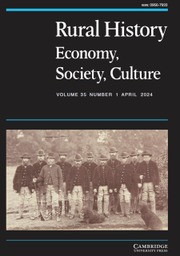Article contents
Commerce and Community in the Countryside: The Social Ambiguity of Market-Oriented Farming in Pre-Industrial Northern South-West Germany (c.1770–1860)
Published online by Cambridge University Press: 16 March 2007
Abstract
In the mainstream literature on the socio-political history of the German countryside in the late eighteenth and nineteenth centuries, the south-west areas of partible inheritance are often stereotypically contrasted with the regions of impartible inheritance in the north and north-west. While the latter were dominated by the antagonism between large peasants and tenant-labourers, it is claimed, the far more homogenous village societies in the south-west were primarily marked by conflicts with external powers such as the state and nobility. This dichotomic model, however, fails to account for major differences in political culture within the south-west, which in many cases cannot simply be explained with reference to divergent social structures, such as property distribution, either. In the following article it is argued that specific forms of agricultural market-integration and their effects on rural status groups had a crucial impact on collective solidarities and local cohesion. This hypothesis is empirically tested by comparatively analysing demographic development, access to land and, most extensively, modes of commercialisation in four exemplary regions on the northern upper Rhine. In the last section, these observations are tentatively related to distinctive forms of political mobilisation.
- Type
- Research Article
- Information
- Copyright
- © 2007 Cambridge University Press
- 1
- Cited by


